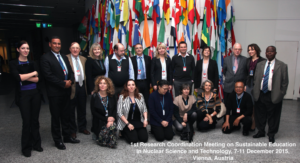 A four-year IAEA Coordinated Research Project (CRP) on Sustainable Education in Nuclear Science and Technology, recently concluded, supported national authorities in the adoption of innovative information and computer technology practices and has enabled further collaboration in nuclear science and technology education in participating countries.
A four-year IAEA Coordinated Research Project (CRP) on Sustainable Education in Nuclear Science and Technology, recently concluded, supported national authorities in the adoption of innovative information and computer technology practices and has enabled further collaboration in nuclear science and technology education in participating countries.
Participants in the CRP from Argentina, Australia, Belarus, Belgium, Bulgaria, Canada, Ghana, Indonesia, Morocco, Russian Federation, Thailand and the United Kingdom jointly developed a systematic approach to various issues related to national education in nuclear science and technology, leading to the following research threads:
• Understand the impact of adopting modern information and computer technologies in nuclear education;
• Formulate main principles for cooperation and collaboration approaches and formats between industry, universities and government, and among countries and regions (e.g. networking and resource sharing mechanisms);
• Collect best practices applied by academia to reach out to schools and society;
• Understand and analyze demographics and gender in nuclear education;
• Develop a set of benchmarking approaches for nuclear education;
• Collect experience and methods of addressing challenges in other engineering disciplines and review their applicability to nuclear education;
• Map nuclear competences in and for nuclear education.
The project team included representatives of the regional network STAR-NET from its two member universities: the Belorussian State University of Informatics and Radioelectronics (BSUIR) and National Research Nuclear University MEPhI of Russian Federation.
For further information related to this CRP, please see the IAEA page.